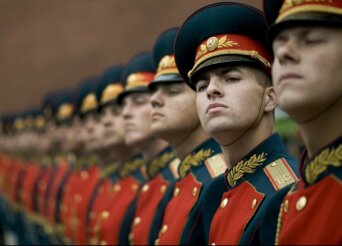- About
- Topics
- Picks
- Audio
- Story
- In-Depth
- Opinion
- News
- Donate
- Signup for our newsletterOur Editors' Best Picks.Send
Read, Debate: Engage.
| topic: | Human Rights |
|---|---|
| located: | Russia |
| editor: | Andrew Getto |
Every year, dozens of young conscripts serving in the Russian army die far away from battlefields. Many of these deaths are a consequence of hazing - an age-old practice of harassing new soldiers, which is still a common practice, despite what the authorities claim.
On 28 September, a 20-year-old private, Ivan Katlinskikh, disappeared from his military base in the Sverdlovsk region; he was found dead later that night. It appears that after hanging his Kalashnikov rifle on a power line ladder, he climbed it. He was, of course, electrocuted and fell from the pole; his army coat caught fire; he took it off and walked another 150 meters, but then tumbled and never got up again.
According to the official explanation by the military, Ivan wanted to use the pole to look around and plan his escape. While the officers were busy cleaning up the mess, another unnatural death took place in the quarters. Early in the morning of 29 September, another serviceman from the same base, 19-year-old Mikhail Pashchuk, received his service weapon at the start of a detail, then stepped outside of a tent and shot himself dead.
Anti-conscription lawyer Alexandr Latynin believes Ivan was well aware of how power lines work and instead committed suicide. On the other hand, Mikhail’s cause of death is not even subject to debate. According to the activist, the two deaths were united by the same motivation: to escape the everyday cycle of violence in the unit.
We had a military base in my small hometown in Siberia. As a kid, I remember the same news every other year: another conscript went off the rails and shot himself and a couple of comrades. When we went there for a class tour in high school, grey-looking soldiers asked us for cigarettes and whispered that we should never end up there under any circumstances.
About 130,000 young men aged 18-27 are conscripted to the Russian army every year. The absolute majority of guys I know have tried, successfully, to dodge enlistment. The desire to do so is not surprising, as the first thing that comes to mind of every Russian when they hear the word “army” is ‘dedovshchina’, or hazing.
Almost every man born in the USSR spent two years of his youth wearing the all-green uniform. Even back then, the practice of dedovshchina was omnipresent. Old-timers, also known as ‘dedy’ or ‘grandfathers’, harassed the rookies until the rookies became old-timers. Part of it was physical: impossible numbers of pushups, standing in excruciating poses for hours and trivial beatings. Part was psychological: those who were in their second year of service made soft freshmen do their laundry.
Senior officers didn’t interfere - and why would they? Hazing gives you a tiny Stalin-era order within your unit: a loyal caste with a license for any kind of abuse keeps the flock exhausted and subdued. The practice continued into independent Russia, because if it’s not broken, why fix it? There is just one side effect: the occasional dead bodies.
Here is just one case: in 2019, private Ramil Shamsutdinov spent 3 days on a watch without almost any sleep. According to him, the officers promised to duck him in a toilet head-first and rape him. He took a gun and killed 8 people that day. And we only hear about the tip of the iceberg.
In the 2010s, the Defense Ministry stopped publishing data on violent deaths in the Armed Forces. When they last did it in 2009, there were 30 such cases per month on average - now the number is unknown. But this doesn’t stop military officials from proclaiming “complete victory over hazing.” The Committee of Soldiers' Mothers of Russia, on the contrary, receives 15-20 complaints of theft, beatings and humiliation in the army every day. And most cases are not even reported out of fear of exposure, according to the NGO.
It wouldn’t be fair to say that the government hasn’t done anything to improve the life of soldiers. The term of service was reduced from two years to one and the share of contract soldiers is steadily rising. Yet, there are no plans to ditch the idea of mandatory service - which, even apart from the violent prison-like customs, is a completely outdated custom that violates civil liberties.
Image by WikiImages

